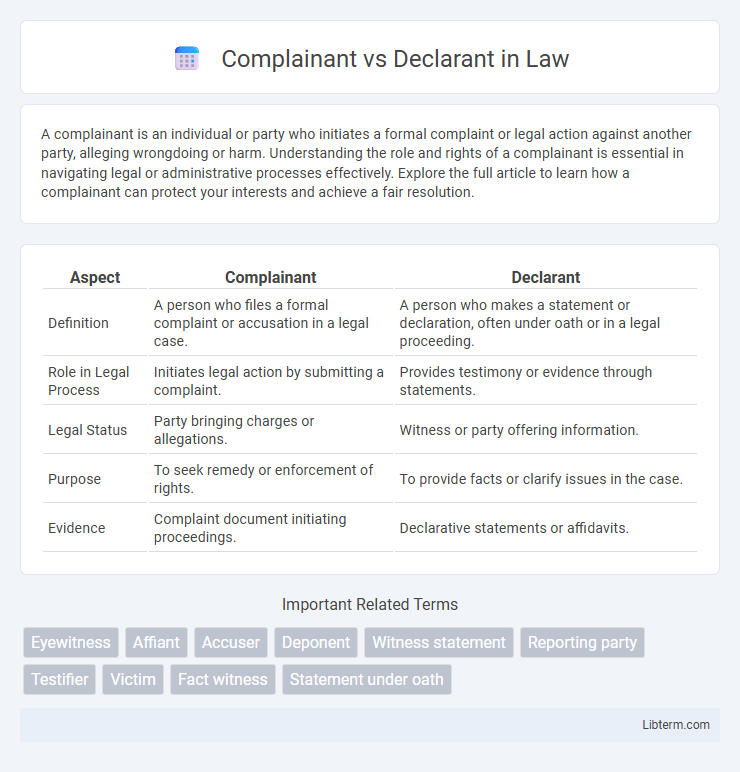A complainant is an individual or party who initiates a formal complaint or legal action against another party, alleging wrongdoing or harm. Understanding the role and rights of a complainant is essential in navigating legal or administrative processes effectively. Explore the full article to learn how a complainant can protect your interests and achieve a fair resolution.
Table of Comparison
| Aspect | Complainant | Declarant |
|---|---|---|
| Definition | A person who files a formal complaint or accusation in a legal case. | A person who makes a statement or declaration, often under oath or in a legal proceeding. |
| Role in Legal Process | Initiates legal action by submitting a complaint. | Provides testimony or evidence through statements. |
| Legal Status | Party bringing charges or allegations. | Witness or party offering information. |
| Purpose | To seek remedy or enforcement of rights. | To provide facts or clarify issues in the case. |
| Evidence | Complaint document initiating proceedings. | Declarative statements or affidavits. |
Understanding the Terms: Complainant vs Declarant
A complainant is an individual or entity who formally files a complaint or accuses another party of wrongdoing, often initiating legal or administrative proceedings. A declarant, in contrast, is a person who makes a formal statement or declaration under oath, typically providing testimony or evidence in legal and official contexts. Understanding the distinction between complainant and declarant is crucial for accurately interpreting legal documents and proceedings, as each plays a distinct role in the judicial process.
Legal Definitions and Key Differences
The complainant is the party who formally files a complaint or initiates legal action by alleging wrongdoing or harm, typically in criminal or civil cases. The declarant, in contrast, is an individual who makes a statement or declaration, often under oath or in legal documents, serving as a source of evidence or information. Key differences include the complainant's role as the initiator of a claim versus the declarant's function as a provider of testimony or factual assertions within legal proceedings.
Roles in Legal Proceedings
The complainant initiates legal proceedings by formally alleging wrongdoing, serving as the primary party bringing a case to court, while the declarant provides testimony or statements as evidence during the trial. The complainant's role is crucial in criminal cases to trigger investigation and prosecution, whereas the declarant's statements must be scrutinized for admissibility under evidentiary rules such as hearsay exceptions. Understanding the distinction clarifies their functions: complainants act as plaintiffs or accusers, and declarants serve as witnesses contributing factual information.
The Complainant’s Responsibilities
The Complainant's responsibilities include providing accurate and detailed information regarding the incident to facilitate investigation and resolution. They must cooperate with authorities or organizations by responding promptly to inquiries and submitting any required evidence or documentation. Maintaining clear communication throughout the process ensures the complaint is effectively addressed and resolved.
The Declarant’s Role Explained
The declarant is the individual who makes a statement or declaration, often serving as a witness to events or facts within legal proceedings. Unlike the complainant who initiates a complaint or claim, the declarant provides firsthand information or testimony pivotal for establishing the truth. Understanding the declarant's role is essential in assessing the reliability and relevance of evidence presented in court.
Impact on Investigations and Case Outcomes
The roles of complainant and declarant differ significantly in investigations, as complainants initiate legal action by formally reporting offenses, thereby triggering investigatory procedures, while declarants provide statements or testimonies that influence the direction and credibility of evidence. Understanding these distinctions enhances case outcomes by ensuring accurate attribution of accountability and strengthening evidentiary foundations during prosecution. Investigators prioritize complainant credibility and declarant consistency to reduce bias and improve judicial decision-making.
Rights and Protections for Each Party
The complainant holds the right to file grievances and seek legal remedies while being protected from retaliation or discrimination. The declarant, as a witness or statement provider, has the right to truthful representation and protection under confidentiality laws to ensure fair legal procedures. Both parties are entitled to due process and access to legal counsel throughout the resolution of disputes.
Common Scenarios Involving Complainants and Declarants
In legal contexts, complainants typically initiate a formal complaint or report about an alleged offense, while declarants provide statements or testimony based on personal knowledge. Common scenarios involving complainants arise in criminal cases where victims or witnesses report crimes to authorities, whereas declarants frequently appear in hearsay exceptions, such as affidavits or sworn declarations in civil litigation. Understanding the roles of complainants and declarants is crucial for evaluating the credibility and admissibility of evidence in court proceedings.
Challenges in Distinguishing Complainant from Declarant
Challenges in distinguishing a complainant from a declarant arise primarily due to overlapping roles in legal contexts, where both provide statements or reports. The complainant initiates a complaint, often alleging wrongdoing, while the declarant merely offers information or testimony without necessarily initiating action. Ambiguity occurs when a witness's statement serves both as evidence and a complaint, complicating the identification of their exact role in judicial proceedings.
Best Practices for Handling Statements and Testimonies
Best practices for handling complainant and declarant statements emphasize accurate documentation and verification to maintain credibility and reliability in legal proceedings. Ensure complaints are recorded promptly and consistently while corroborating declarant testimonies through cross-examination and supporting evidence. Maintaining objectivity and confidentiality throughout the process protects the integrity of the statements and upholds procedural fairness.
Complainant Infographic

 libterm.com
libterm.com